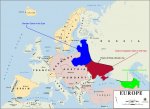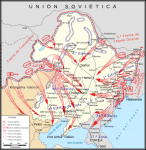As we approach Memorial Day, it might be time to honor a promise I made a while back as Brad closed his "WW II this day" series. I said I would start something about the Cold war. The methodological problems were immediate. First, while a series on WW II from 5 June 44 to 7 May 45 is doable and bounded, the Cold War was decades long and any "anniversary" of one event will step on some other anniversary of an event that happened years prior or years afterwards. Second, while WW II was mostly military, the Cold War was multi-disciplinary. Some military, some political, some diplomatic, some economic, etc.
A friend turned me on to the CNN Cold War series from 1998. It is pretty good. Narrated by Kenneth Branagh, it consists of 24 episodes which are generally thematic by chronology (in other words, the Korea episode is before the Vietnam episode). ~46 minutes per episode, and available for free on Youtube. (Some Romanian guy posted them and Youtube has not pulled them down. Maybe CNN does not care about any copyright infringement.)
So, what I would propose is that interested folks watch one episode per week, and we can discuss here. A week from now, I will post the next episode and we can discuss topics related to that episode. If after a couple of weeks, nobody joins the conversation, I will let this thread die.
First up: "Comrades."
A friend turned me on to the CNN Cold War series from 1998. It is pretty good. Narrated by Kenneth Branagh, it consists of 24 episodes which are generally thematic by chronology (in other words, the Korea episode is before the Vietnam episode). ~46 minutes per episode, and available for free on Youtube. (Some Romanian guy posted them and Youtube has not pulled them down. Maybe CNN does not care about any copyright infringement.)
So, what I would propose is that interested folks watch one episode per week, and we can discuss here. A week from now, I will post the next episode and we can discuss topics related to that episode. If after a couple of weeks, nobody joins the conversation, I will let this thread die.
First up: "Comrades."




